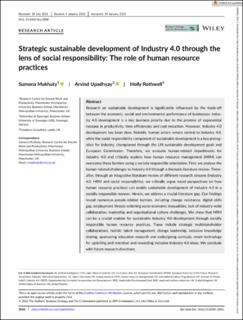| dc.contributor.author | Mukhuty, Sumona | |
| dc.contributor.author | Upadhyay, Arvind | |
| dc.contributor.author | Rothwell, Holly | |
| dc.date.accessioned | 2022-12-20T14:07:59Z | |
| dc.date.available | 2022-12-20T14:07:59Z | |
| dc.date.created | 2022-01-23T11:01:44Z | |
| dc.date.issued | 2022-02 | |
| dc.identifier.citation | Mukhuty, S., Upadhyay, A., Rothwell, H. (2022) Strategic sustainable development of Industry 4.0 through the lens of social responsibility: The role of human resource practices. Business Strategy and The Environment, 31(5), 2068-2081 | en_US |
| dc.identifier.issn | 0964-4733 | |
| dc.identifier.uri | https://hdl.handle.net/11250/3038893 | |
| dc.description.abstract | Research on sustainable development is significantly influenced by the trade-off between the economic, social, and environmental performance of businesses. Industry 4.0 development is a key business priority due to the promise of exponential increase in productivity, time efficiencies and cost reduction. However, industry 4.0 development has been slow. Notably, human actors remain central to industry 4.0; while the social responsibility component of sustainable development is a key prerogative for industry, championed through the UN sustainable development goals and European Commission. Therefore, we evaluate human-related impediments for industry 4.0 and critically explore how human resource management (HRM) can overcome these barriers using a socially responsible orientation. First, we analyse the human-related challenges to industry 4.0 through a thematic literature review. Thereafter, through an integrative literature review of different research streams (industry 4.0, HRM and social responsibility), we critically argue novel perspectives on how human resource practices can enable sustainable development of industry 4.0 in a socially responsible manner. Herein, we address a crucial literature gap. Our findings reveal numerous people-related barriers, including change resistance, digital skills gap, employment threats widening socio-economic inequalities, lack of industry-wide collaboration, leadership, and organisational culture challenges. We show that HRM can be a crucial enabler for sustainable industry 4.0 development through socially responsible human resource practices. These include strategic multi-stakeholder collaborations, holistic talent management, change leadership, inclusive knowledge sharing, sponsoring education research and co-designing curricula, smart technology for upskilling and retention, rewarding inclusive industry 4.0 ideas and so on. We conclude with future research directions. | en_US |
| dc.description.abstract | Strategic sustainable development of Industry 4.0 through the lens of social responsibility: The role of human resource practices | en_US |
| dc.language.iso | eng | en_US |
| dc.publisher | ERP Environment and John Wiley & Sons Ltd. | en_US |
| dc.relation.uri | https://onlinelibrary.wiley.com/doi/10.1002/bse.3008 | |
| dc.rights | Navngivelse 4.0 Internasjonal | * |
| dc.rights.uri | http://creativecommons.org/licenses/by/4.0/deed.no | * |
| dc.subject | økonomi | en_US |
| dc.subject | business | en_US |
| dc.subject | industri | en_US |
| dc.title | Strategic sustainable development of Industry 4.0 through the lens of social responsibility: The role of human resource practices | en_US |
| dc.type | Peer reviewed | en_US |
| dc.type | Journal article | en_US |
| dc.description.version | publishedVersion | en_US |
| dc.rights.holder | © 2022 The Authors | en_US |
| dc.subject.nsi | VDP::Samfunnsvitenskap: 200::Økonomi: 210::Bedriftsøkonomi: 213 | en_US |
| dc.source.pagenumber | 2068-2081 | en_US |
| dc.source.volume | 31 | en_US |
| dc.source.journal | Business Strategy and the Environment (BSE) | en_US |
| dc.source.issue | 5 | en_US |
| dc.identifier.doi | 10.1002/bse.3008 | |
| dc.identifier.cristin | 1988013 | |
| cristin.ispublished | true | |
| cristin.fulltext | preprint | |
| cristin.fulltext | original | |
| cristin.qualitycode | 1 | |

